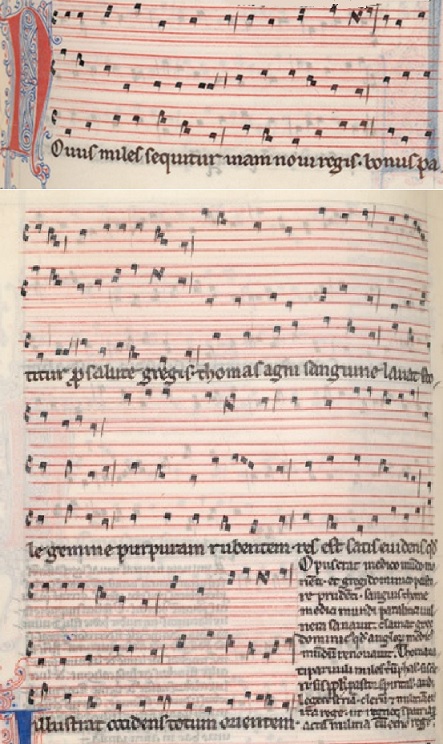| Novus miles sequitur |
音楽エッセイのページへ戻る
初期多声音楽
St.マーシャル楽派へ
レオナン Videruntへ
NotreDame school(condctus)へ
 Payneの分類では第2グループに属する。 Another conductus written in the twelfth century that may well have been updated in the thirteenth is Novus miles sequitur. The conductus is believed to have been written to commemorate the death of St Thomas( Becket, 1118年12月21日[1] - 1170年12月29日 ヘンリー2世の怒りを買って暗殺された) of Canterbury, in 1173年(ローマ教皇アレクサンデル3世によって列聖された), but Payne points out that it is the only datable conductus written in three parts before 1198. Sanders also states that it is too early a date for a three-part conductus, and moreover that the work is in two parts in two of the extant sources, and only in three parts in one source. This, he suggests, may be because the triplum was added at a later date.34 St Thomas Becket's remains were transferred to a shrine in 1220,35 which may have provided an occasion for the conductus to be updated. Relationships between the Twelfth-Century Aquitanian Polyphonic Versus and Two-Part Conductus Repertories p96~97(PDFページ) Christopher Page presents three alternative transcriptions of the opening of the conductus Novus miles sequitur before he goes on to discuss the difficulties associated with more rhythmically complex conductus such as the "flamboyant" Fraude ceca desolato, describing the style of Novus miles sequitur as "simple and syllabic." The conductus in the classic group have cum littera sections that are similar in style to Novus miles sequitur. Page's three suggested ways of transcribing the cum littera sections of Novus miles sequitur are ①in an isosyllabic style with a triple beat division, ②in an isosyllabic style with a duple beat division, and ③in "quasi-modal rhythm." The third way seems to me to be the least likely of the approaches, because of the absence of modal rhythm in the cum littera sections of conductus discussed above by Sanders, and because, as Page himself explains a few pages later in his monograph, the much-used modal theory of the twentieth century has been rendered implausible by more recent research. (同書p105) http://teca.bmlonline.it/ImageViewer/servlet/ImageViewer?idr=TECA0000342136#page/649/mode/1up Ver pacis pacis aperit telluris gremium / Salutis reperit Remis remigium / lam Petrus exerit utrumque gladium/ Quo procul aberit incursus hostium... In unum confluit totus fons gratie / Cuius ros imbuii rus conscientie / Rivum, quem genuit rigor lustitae / Flumen preterfluit misericordie (c.f.320r) http://www.diamm.ac.uk/jsp/Descriptions?op=SOURCE&sourceKey=919 |